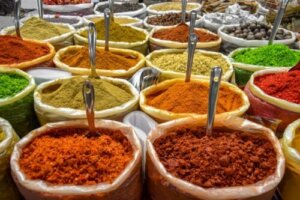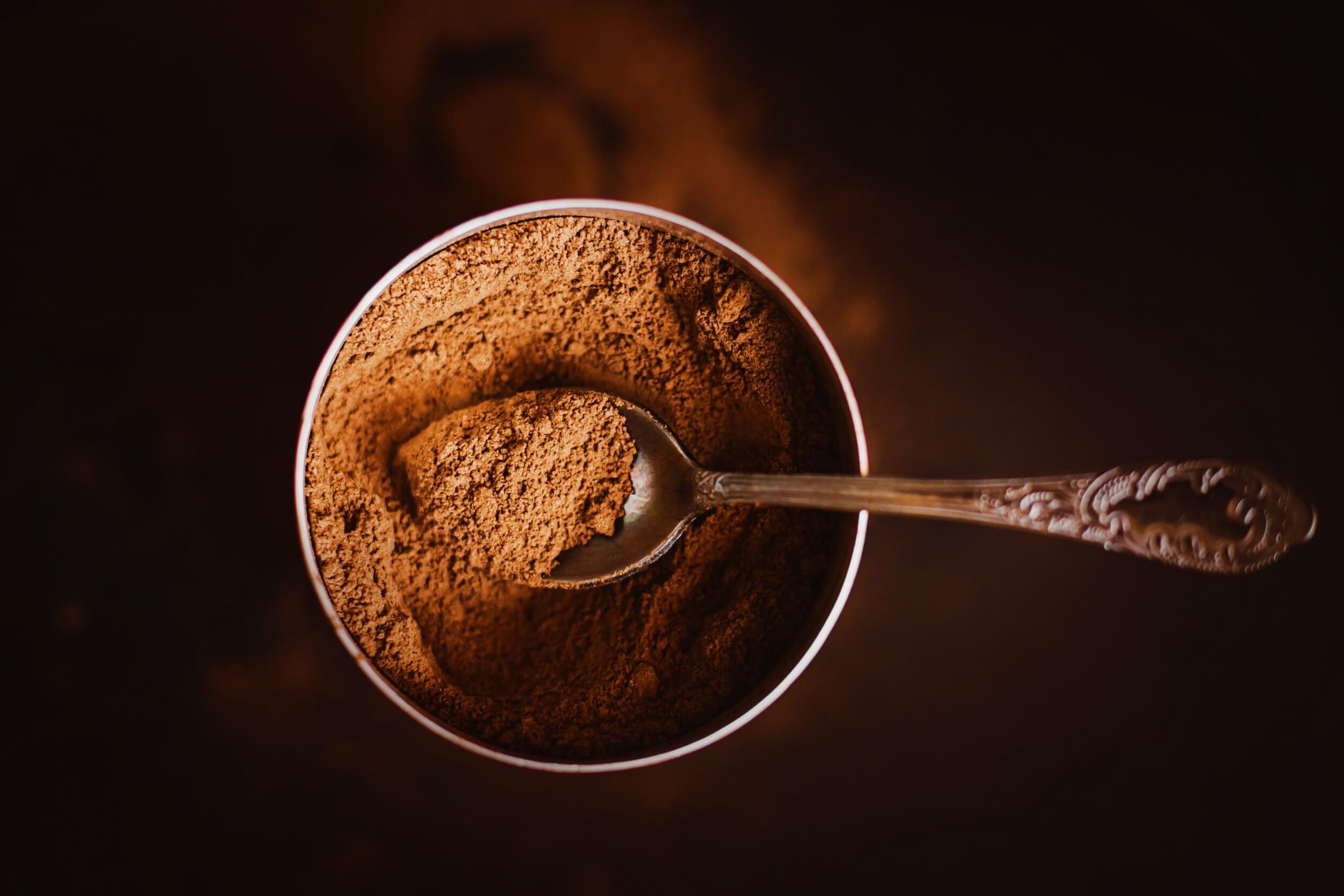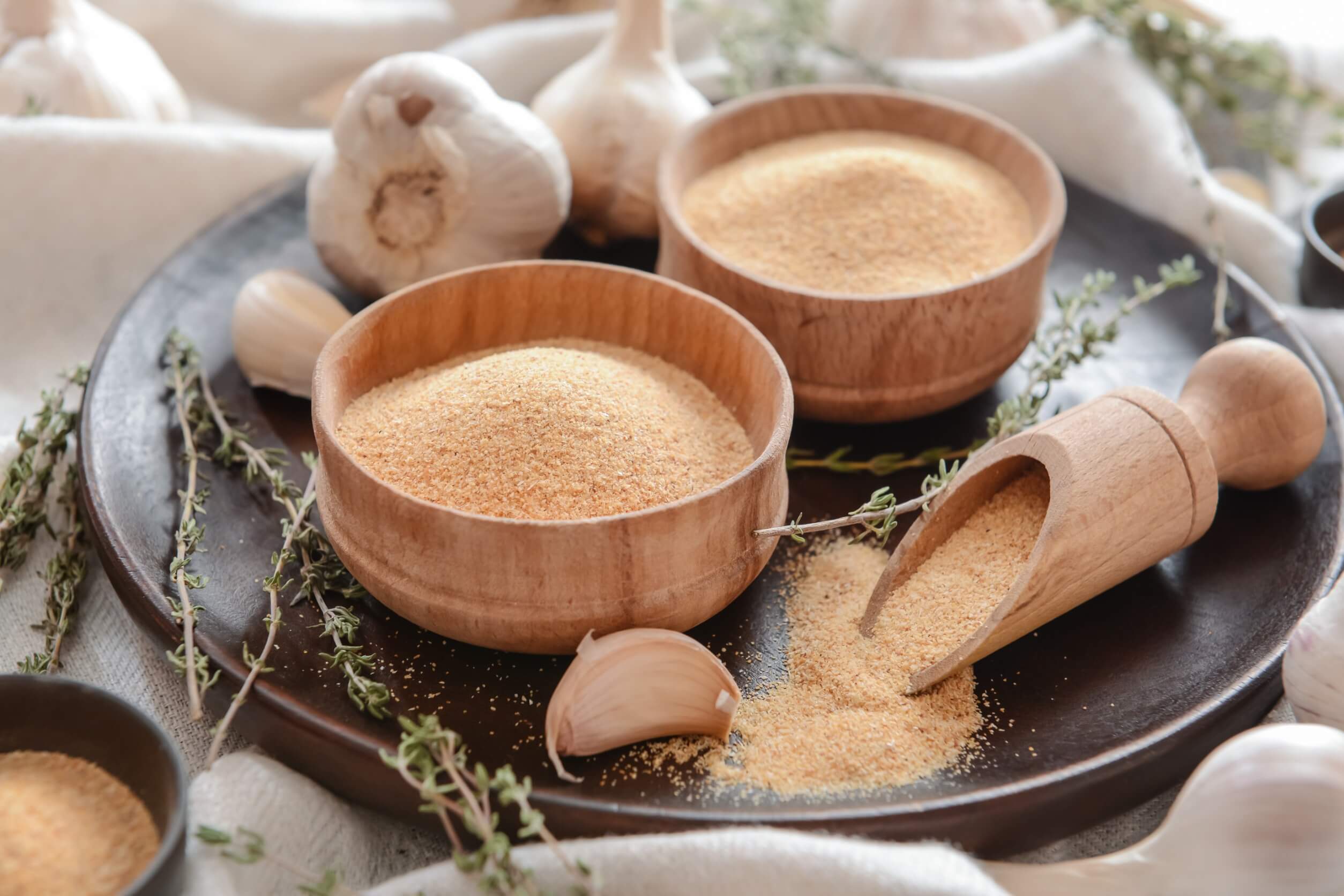What Spices Are Safe During Pregnancy?

Are you expecting and wondering what spices you can use? Well, you should know that not all spices are safe during pregnancy. Spices are widely used in gastronomy for their active ingredients that give an intense aroma, color, and above all, flavor to dishes. However, some of these compounds can pass directly to the baby and cause harm.
We recommend practicing caution so as not to have problems with the spices you’re going to use in the kitchen. Therefore, in addition to consulting a professional, we’ll provide you with the following list so that you are aware of which ones you can use.
What are spices?
To be clearer, let’s start by defining spices. They refer to the hard parts of plants that are used to add flavor, color, or aroma to food.
They include bark (cinnamon), seeds (mustard), pods (vanilla), roots (ginger), or berries (pepper). The term is also used to refer to the leaves of some plants or to their flowers, such as the saffron.
Herbs, on the other hand, refer specifically to the leaves or stems of herbaceous plants such as bay leaves, oregano, parsley, and thyme, among others. When spices are mixed with herbs, we refer to them as condiments.
Read also: Spices Prohibited During Breastfeeding
What about their safety?
There’s a widespread belief that spices and herbs are safe because they’ve been used for a long time and because they’re natural. But these characteristics are no guarantee of safety.
Their active ingredients such as essential oils, alkaloids, alcohols, flavonoids, and saponins, among many others, are responsible for the potent aroma and flavor.
However, these components go beyond a simple sensory experience–they can also cause adverse effects to both mother and baby. Especially if they pass directly through the placenta or breast milk during lactation.
In this context, the American Pregnancy Association states that qualifying an herb or spice as “safe” can be confusing and difficult to interpret, as it depends on the type of use and the amount used.
For example, adverse effects may appear when ingested in high amounts, but in low proportions, such as those used in food seasoning, may not.
Likewise, not all spices have studies that demonstrate their safety for pregnant women. For this reason, you should be aware of the risk you’re exposed to when ingesting them and, therefore, you should consult a professional.
Read also: 5 Dangerous Infusions that You Should Avoid During Pregnancy
What spices are safe to take during pregnancy?
Here’s a list of spices that you can ingest during pregnancy. There are few that can be used with a certain margin of safety, but they should still have the approval of a specialist, as not all pregnancies are the same.
Cinnamon

Cinnamon is the dried bark of the Cinnamomum verum tree, which belongs to the same family as laurel. It can be used either whole or ground, and its special aroma together with its pleasant and sweet flavor allows it to season both sweet and savory dishes.
Two are the most popular: The one used in Europe, called Ceylon cinnamon, which is rolled into the well-known cinnamon sticks, and the Cassia or Chinese cinnamon, which has a spicier flavor and is more commonly used in North America.
As for its safety, there’s still no evidence to support its use to facilitate childbirth. In contrast, the U.S. Department of Health and Human Services gives Ceylon cinnamon a green light in regard to its consumption during pregnancy, as long as it’s taken in the usual amounts in preparations.
In the case of Cassia, its use is more restricted, due to the presence of an active substance called coumarin that can cause damage to the liver, especially when ingested in sensitive people and in a prolonged manner.
Ginger
Ginger is the root or rhizome of the plant and is found whole, powdered, or cut into slices. It’s very aromatic and has a spicy, pungent, and sweet flavor.
In cooking, it’s used in sweet fruit-based dishes or to prepare the famous gingerbread cookies. It can also be used in savory preparations such as sautéed vegetables, sauces, meats, cream soups, fish, and seafood.
Its analgesic, anti-inflammatory, and digestive properties are recognized. A review of its use in pregnancy revealed that it’s safe and effective in relieving symptoms of nausea and vomiting, comparable to taking vitamin B6 or pyridoxine. However, emphasis is placed on the amount to be used, as it can’t be more than 1 gram per day.
Mustard seeds
Mustard is a plant of the cruciferous family with great gastronomic interest. Its seeds can be white, brownish yellow (Brassica alba), and black (Brassica nigris). When the yellow seeds are ground, they’re transformed into the traditional sauce that has a strong pungent flavor.
Its flavor is a little spicy and is used to season meats and as a dressing for salads and vegetables. As long as it’s used sparingly, it’s among the spices that are considered safe to consume during pregnancy.
However, Offarm magazine has long published that black mustard isn’t recommended in pregnancy or breastfeeding, as there are no known data to support its safety.
Cloves
Cloves are dried, unripe flower buds of a plant that’s native to Indonesia called the clove tree.
It’s one of the richest spices in an essential oil called eugenol, also present in cinnamon, bay leaf, and nutmeg. It’s capable of relieving digestive disorders such as nausea and vomiting, so it can be used in the first trimester of pregnancy.
Its invasive smell and taste are used in cooking in sweet and savory dishes such as braised meats and marinated game meat.
Although so far, there’s no scientific evidence that raises alarms about banning its use in pregnancy, always limit the amount of the active ingredient ingested with the spice.
Garlic powder

Garlic is a spice belonging to the Liliaceae family, native to Asia. Since ancient times, its bulbs have been used for culinary purposes, especially as a seasoning and marinade for meat and fish. However, it can also be used in vegetables.
Pharmacist López Luengo points out that there aren’t enough scientific reports about the adverse effects of garlic during pregnancy or breastfeeding. However, it’s best not to ingest doses that exceed the amounts used in preparations.
The amounts of garlic powder to be consumed by pregnant women should be consulted with a specialist. Taking into account that, for an adult, it’s 600 to 900 milligrams per day. What’s clear is that garlic alters the taste of breast milk and consequently affects the behavior of infants.
Are the rest of the spices safe to consume during pregnancy?
Pregnant women should practice a great degree of precaution regarding the consumption of other spices such as cayenne, nutmeg, pepper, saffron, cumin, licorice, fennel, fenugreek seeds, and turmeric.
It’s important to always consult a professional such as an herbalist about other traditional herbs in the kitchen and ensure the safety of these products.
Remember that the suggested amounts of spices that can be taken during pregnancy are those contained in foods or preparations.
Are you expecting and wondering what spices you can use? Well, you should know that not all spices are safe during pregnancy. Spices are widely used in gastronomy for their active ingredients that give an intense aroma, color, and above all, flavor to dishes. However, some of these compounds can pass directly to the baby and cause harm.
We recommend practicing caution so as not to have problems with the spices you’re going to use in the kitchen. Therefore, in addition to consulting a professional, we’ll provide you with the following list so that you are aware of which ones you can use.
What are spices?
To be clearer, let’s start by defining spices. They refer to the hard parts of plants that are used to add flavor, color, or aroma to food.
They include bark (cinnamon), seeds (mustard), pods (vanilla), roots (ginger), or berries (pepper). The term is also used to refer to the leaves of some plants or to their flowers, such as the saffron.
Herbs, on the other hand, refer specifically to the leaves or stems of herbaceous plants such as bay leaves, oregano, parsley, and thyme, among others. When spices are mixed with herbs, we refer to them as condiments.
Read also: Spices Prohibited During Breastfeeding
What about their safety?
There’s a widespread belief that spices and herbs are safe because they’ve been used for a long time and because they’re natural. But these characteristics are no guarantee of safety.
Their active ingredients such as essential oils, alkaloids, alcohols, flavonoids, and saponins, among many others, are responsible for the potent aroma and flavor.
However, these components go beyond a simple sensory experience–they can also cause adverse effects to both mother and baby. Especially if they pass directly through the placenta or breast milk during lactation.
In this context, the American Pregnancy Association states that qualifying an herb or spice as “safe” can be confusing and difficult to interpret, as it depends on the type of use and the amount used.
For example, adverse effects may appear when ingested in high amounts, but in low proportions, such as those used in food seasoning, may not.
Likewise, not all spices have studies that demonstrate their safety for pregnant women. For this reason, you should be aware of the risk you’re exposed to when ingesting them and, therefore, you should consult a professional.
Read also: 5 Dangerous Infusions that You Should Avoid During Pregnancy
What spices are safe to take during pregnancy?
Here’s a list of spices that you can ingest during pregnancy. There are few that can be used with a certain margin of safety, but they should still have the approval of a specialist, as not all pregnancies are the same.
Cinnamon

Cinnamon is the dried bark of the Cinnamomum verum tree, which belongs to the same family as laurel. It can be used either whole or ground, and its special aroma together with its pleasant and sweet flavor allows it to season both sweet and savory dishes.
Two are the most popular: The one used in Europe, called Ceylon cinnamon, which is rolled into the well-known cinnamon sticks, and the Cassia or Chinese cinnamon, which has a spicier flavor and is more commonly used in North America.
As for its safety, there’s still no evidence to support its use to facilitate childbirth. In contrast, the U.S. Department of Health and Human Services gives Ceylon cinnamon a green light in regard to its consumption during pregnancy, as long as it’s taken in the usual amounts in preparations.
In the case of Cassia, its use is more restricted, due to the presence of an active substance called coumarin that can cause damage to the liver, especially when ingested in sensitive people and in a prolonged manner.
Ginger
Ginger is the root or rhizome of the plant and is found whole, powdered, or cut into slices. It’s very aromatic and has a spicy, pungent, and sweet flavor.
In cooking, it’s used in sweet fruit-based dishes or to prepare the famous gingerbread cookies. It can also be used in savory preparations such as sautéed vegetables, sauces, meats, cream soups, fish, and seafood.
Its analgesic, anti-inflammatory, and digestive properties are recognized. A review of its use in pregnancy revealed that it’s safe and effective in relieving symptoms of nausea and vomiting, comparable to taking vitamin B6 or pyridoxine. However, emphasis is placed on the amount to be used, as it can’t be more than 1 gram per day.
Mustard seeds
Mustard is a plant of the cruciferous family with great gastronomic interest. Its seeds can be white, brownish yellow (Brassica alba), and black (Brassica nigris). When the yellow seeds are ground, they’re transformed into the traditional sauce that has a strong pungent flavor.
Its flavor is a little spicy and is used to season meats and as a dressing for salads and vegetables. As long as it’s used sparingly, it’s among the spices that are considered safe to consume during pregnancy.
However, Offarm magazine has long published that black mustard isn’t recommended in pregnancy or breastfeeding, as there are no known data to support its safety.
Cloves
Cloves are dried, unripe flower buds of a plant that’s native to Indonesia called the clove tree.
It’s one of the richest spices in an essential oil called eugenol, also present in cinnamon, bay leaf, and nutmeg. It’s capable of relieving digestive disorders such as nausea and vomiting, so it can be used in the first trimester of pregnancy.
Its invasive smell and taste are used in cooking in sweet and savory dishes such as braised meats and marinated game meat.
Although so far, there’s no scientific evidence that raises alarms about banning its use in pregnancy, always limit the amount of the active ingredient ingested with the spice.
Garlic powder

Garlic is a spice belonging to the Liliaceae family, native to Asia. Since ancient times, its bulbs have been used for culinary purposes, especially as a seasoning and marinade for meat and fish. However, it can also be used in vegetables.
Pharmacist López Luengo points out that there aren’t enough scientific reports about the adverse effects of garlic during pregnancy or breastfeeding. However, it’s best not to ingest doses that exceed the amounts used in preparations.
The amounts of garlic powder to be consumed by pregnant women should be consulted with a specialist. Taking into account that, for an adult, it’s 600 to 900 milligrams per day. What’s clear is that garlic alters the taste of breast milk and consequently affects the behavior of infants.
Are the rest of the spices safe to consume during pregnancy?
Pregnant women should practice a great degree of precaution regarding the consumption of other spices such as cayenne, nutmeg, pepper, saffron, cumin, licorice, fennel, fenugreek seeds, and turmeric.
It’s important to always consult a professional such as an herbalist about other traditional herbs in the kitchen and ensure the safety of these products.
Remember that the suggested amounts of spices that can be taken during pregnancy are those contained in foods or preparations.
All cited sources were thoroughly reviewed by our team to ensure their quality, reliability, currency, and validity. The bibliography of this article was considered reliable and of academic or scientific accuracy.
- Suárez, M, Menéndez Granda, Vázquez Fernández, García Fernández, Suárez Pérez, Rodríguez García,Gómez de Cos, Sánchez Huerta. 2020. El Uso Del Jengibre Como Antiemético Durante El Embarazo. Disponible en: https://revistamedica.com/uso-jengibre-antiemetico-embarazo/.
- López Luengo, M. (2003). Plantas medicinales antiinflamatorias utilizadas en el tratamiento del reumatismo. 22,6,118-122. Disponible en: https://www.elsevier.es/es-revista-offarm-4-articulo-plantas-medicinales-antiinflamatorias-utilizadas-el-13049115.
- MedlinePlus. Clavo. Disponible en: https://medlineplus.gov/spanish/druginfo/natural/251.html.
- López Luengo M. (2007). El ajo. Offarm. 26,1,78-81. Disponible en: https://www.elsevier.es/es-revista-offarm-4-articulo-el-ajo-13097334.
This text is provided for informational purposes only and does not replace consultation with a professional. If in doubt, consult your specialist.








